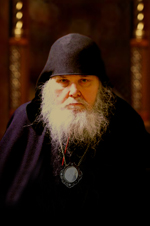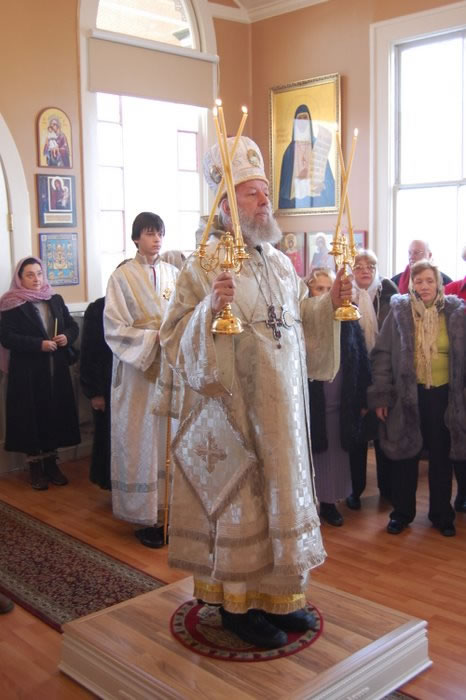I have listened to part of it and decided to post some thoughts here. The following is a part of the "question and answer" discussion following the lecture. He is responding to a question from somebody who had been involved in the World Council of Churches, and had shared some of his negative impressions of it as affirming lowest common denominator religion, where we all 'believe in "Christ" in whom we have no common opinion whatsoever'.
This will seem unpolished for a written piece but please remember that it was not originally a prepared presentation. What follows is my transcription of a small portion of what Blessed Seraphim had to say. I was unable to work out the identity of the author of the book on which he comments but that is not of direct relevance here.
...a very interesting man - although he was a little crazy in some ways - but he had in his last few years became very changed. In fact, he said he felt very strange going to church because he felt that the age of the catacombs was about to come back and that we should go underground to go to church. But he, under the impulse of the last year or two of his life, he wrote a book called Three Conversations on Antichrist and the End of the World, which he sets more like a novel on the coming of Antichrist, and he bases it in the 21st century: world wars and there's a great man - a leader - arises and first becomes president of Europe and then by acclamation he's made president of the world for life, and then world emperor. And he reunites everyone under the basis of like a Roman empire, and then decides he has to have a religious division so he calls a world ecumenical council in Jerusalem and there he offers to all people all that they ever desired so that they sort of acknowledge him, bow down to him.
And the protestants have a special academy opened to explore the scriptures from all different points of view and all different kinds of biblical criticism. And the Catholics have, like, a papal institute, or something or other. And the Orthodox are offered in Constantinople, Hagia Sofia is restored and is meant to be a museum of all possible Orthodox antiquities where every kind of beautiful thing which Orthodox ever had is on display in the museum. That is to satisfy the Orthodox people. And after everyone is satisfied we then all bow down and worship him.
Of course that means that you are satisfied with external things, you think this sort of external point of view represents your religion. Anyone who is attracted by glittering censers, incense, and beautiful vestments first of all, of course he will fall down before Antichrist.
What I found most interesting is how this ties in with personal recent events. Within the past week I received an e-mail with a link to an online petition. This was a petition to the European Parliament to make Turkey's admission into the EU conditional upon the return of Agia Sofia to the Church.
I did sign it but I must confess that, almost immediately afterwards, I thought, 'but why?' Would it once again be a parish? Because of past and present regimes, there are barely enough Orthodox Christians in the whole of Turkey to fill that one building. What purpose would it serve? Even if it were returned, how would it be maintained? What, really, is our desire to get this church back? I am not saying that it should not happen but I'm just not sure what I think. (Incidentally, after signing, I realised that I did actually link to the very same petition myself some time back, on this very blog, some four years ago.)
Here we are, investing so much effort into petitioning the European Parliament - to which our government has pledged allegiance although many of us view it with great suspicion - to give us back Agia Sofia, for which nobody can see any purpose other than it being a museum, while those efforts could be spent elsewhere, on our prayers, on our salvation, on helping the poor and needy, on examining our consciences, making confession, on visiting the sick and the imprisoned, (on maintaining pointless blogs?). Yet, nearly thirty years ago, Father Seraphim warned us of this, and told us that our faith is not based on the external trappings alone, beneficial and vital though they are. So, by all means sign the petition, but first consider why. Is it because you believe that this could be a sign of the restoration of the Faith to Turkey and a source of encouragement to those who pray and fight for this, or is it because of a misplaced sentimentality for the external beauty of abygone age? Let Father Seraphim's final words in the above quotation be a warning to all of us.

Blessed Seraphim, pray to God for us!

























